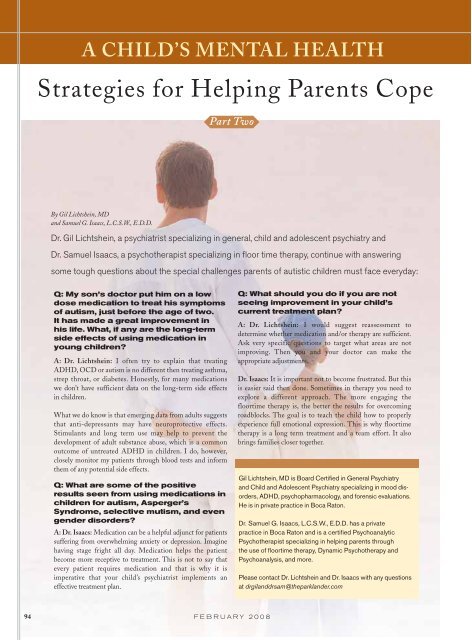February 2008 - The Parklander Magazine
February 2008 - The Parklander Magazine
February 2008 - The Parklander Magazine
- No tags were found...
Create successful ePaper yourself
Turn your PDF publications into a flip-book with our unique Google optimized e-Paper software.
A CHILD’S MENTAL HEALTHStrategies for Helping Parents CopePart TwoBy Gil Lichtshein, MDand Samuel G. Isaacs, L.C.S.W., E.D.D.Dr. Gil Lichtshein, a psychiatrist specializing in general, child and adolescent psychiatry andDr. Samuel Isaacs, a psychotherapist specializing in floor time therapy, continue with answeringsome tough questions about the special challenges parents of autistic children must face everyday:Q: My son’s doctor put him on a lowdose medication to treat his symptomsof autism, just before the age of two.It has made a great improvement inhis life. What, if any are the long-termside effects of using medication inyoung children?A: Dr. Lichtshein: I often try to explain that treatingADHD, OCD or autism is no different then treating asthma,strep throat, or diabetes. Honestly, for many medicationswe don’t have sufficient data on the long-term side effectsin children.What we do know is that emerging data from adults suggeststhat anti-depressants may have neuroprotective effects.Stimulants and long term use may help to prevent thedevelopment of adult substance abuse, which is a commonoutcome of untreated ADHD in children. I do, however,closely monitor my patients through blood tests and informthem of any potential side effects.Q: What are some of the positiveresults seen from using medications inchildren for autism, Asperger’sSyndrome, selective mutism, and evengender disorders?A: Dr. Isaacs: Medication can be a helpful adjunct for patientssuffering from overwhelming anxiety or depression. Imaginehaving stage fright all day. Medication helps the patientbecome more receptive to treatment. This is not to say thatevery patient requires medication and that is why it isimperative that your child’s psychiatrist implements aneffective treatment plan.Q: What should you do if you are notseeing improvement in your child’scurrent treatment plan?A: Dr. Lichtshein: I would suggest reassessment todetermine whether medication and/or therapy are sufficient.Ask very specific questions to target what areas are notimproving. <strong>The</strong>n you and your doctor can make theappropriate adjustments.Dr. Isaacs: It is important not to become frustrated. But thisis easier said then done. Sometimes in therapy you need toexplore a different approach. <strong>The</strong> more engaging thefloortime therapy is, the better the results for overcomingroadblocks. <strong>The</strong> goal is to teach the child how to properlyexperience full emotional expression. This is why floortimetherapy is a long term treatment and a team effort. It alsobrings families closer together.Gil Lichtshein, MD is Board Certified in General Psychiatryand Child and Adolescent Psychiatry specializing in mood disorders,ADHD, psychopharmacology, and forensic evaluations.He is in private practice in Boca Raton.Dr. Samuel G. Isaacs, L.C.S.W., E.D.D. has a privatepractice in Boca Raton and is a certified PsychoanalyticPsychotherapist specializing in helping parents throughthe use of floortime therapy, Dynamic Psychotherapy andPsychoanalysis, and more.Please contact Dr. Lichtshein and Dr. Isaacs with any questionsat drgilanddrsam@theparklander.com94 FEBRUARY <strong>2008</strong>
















